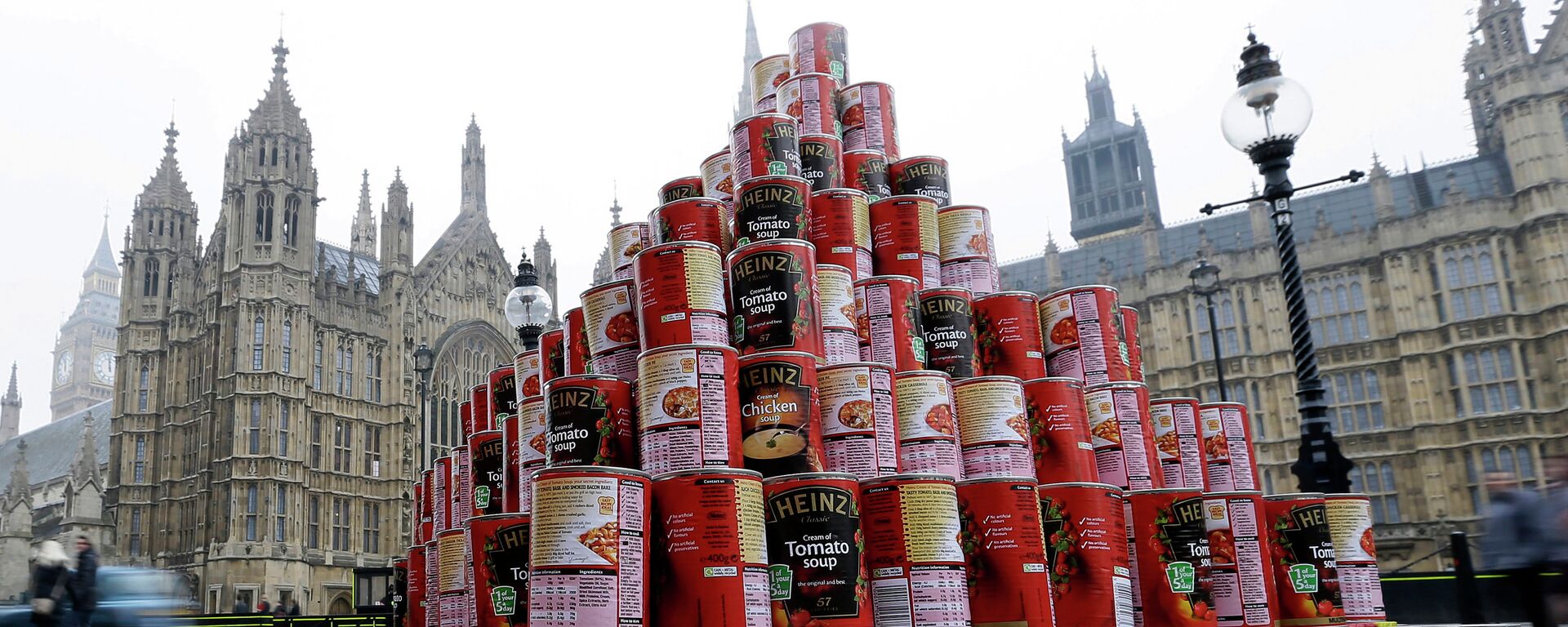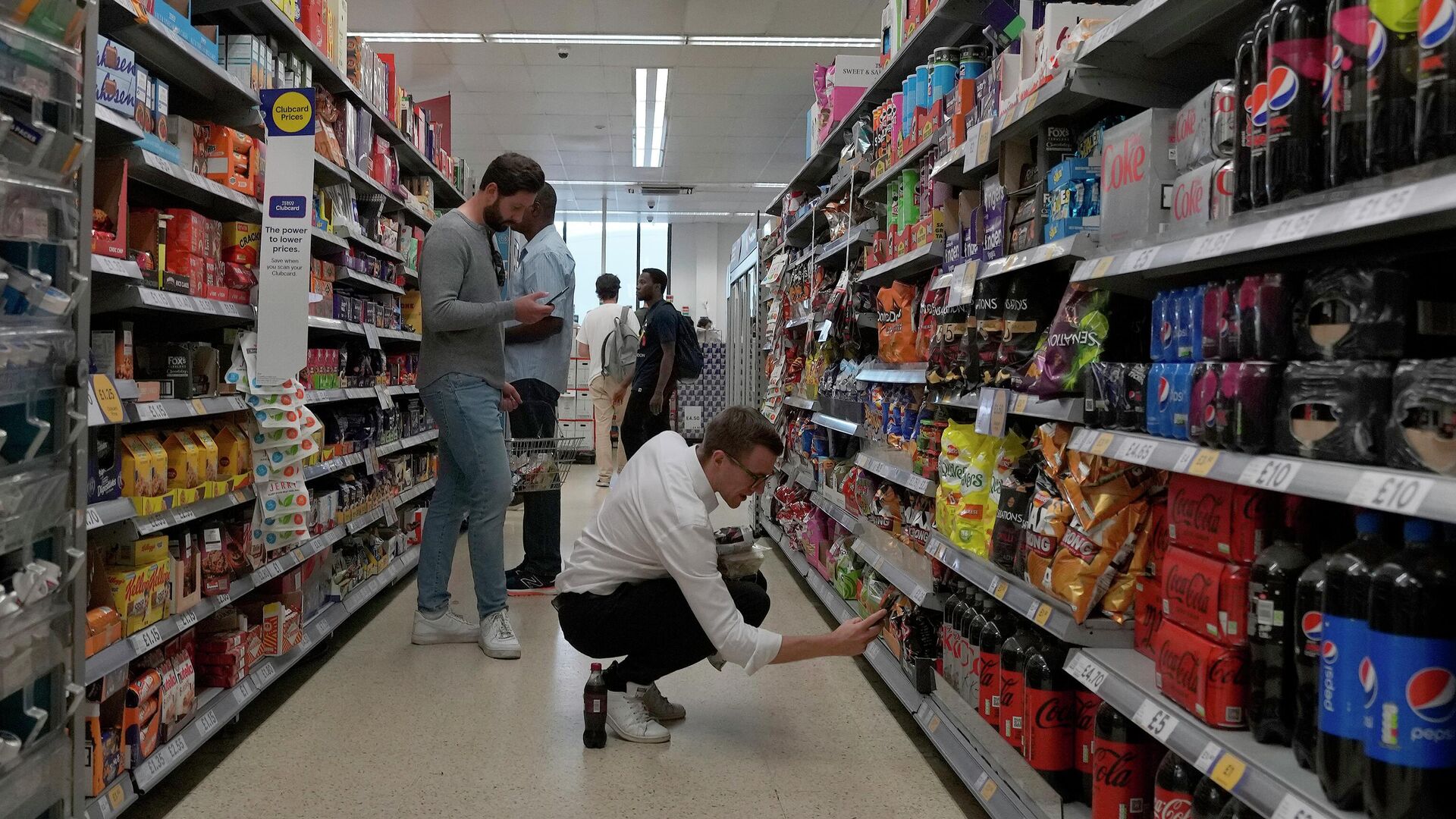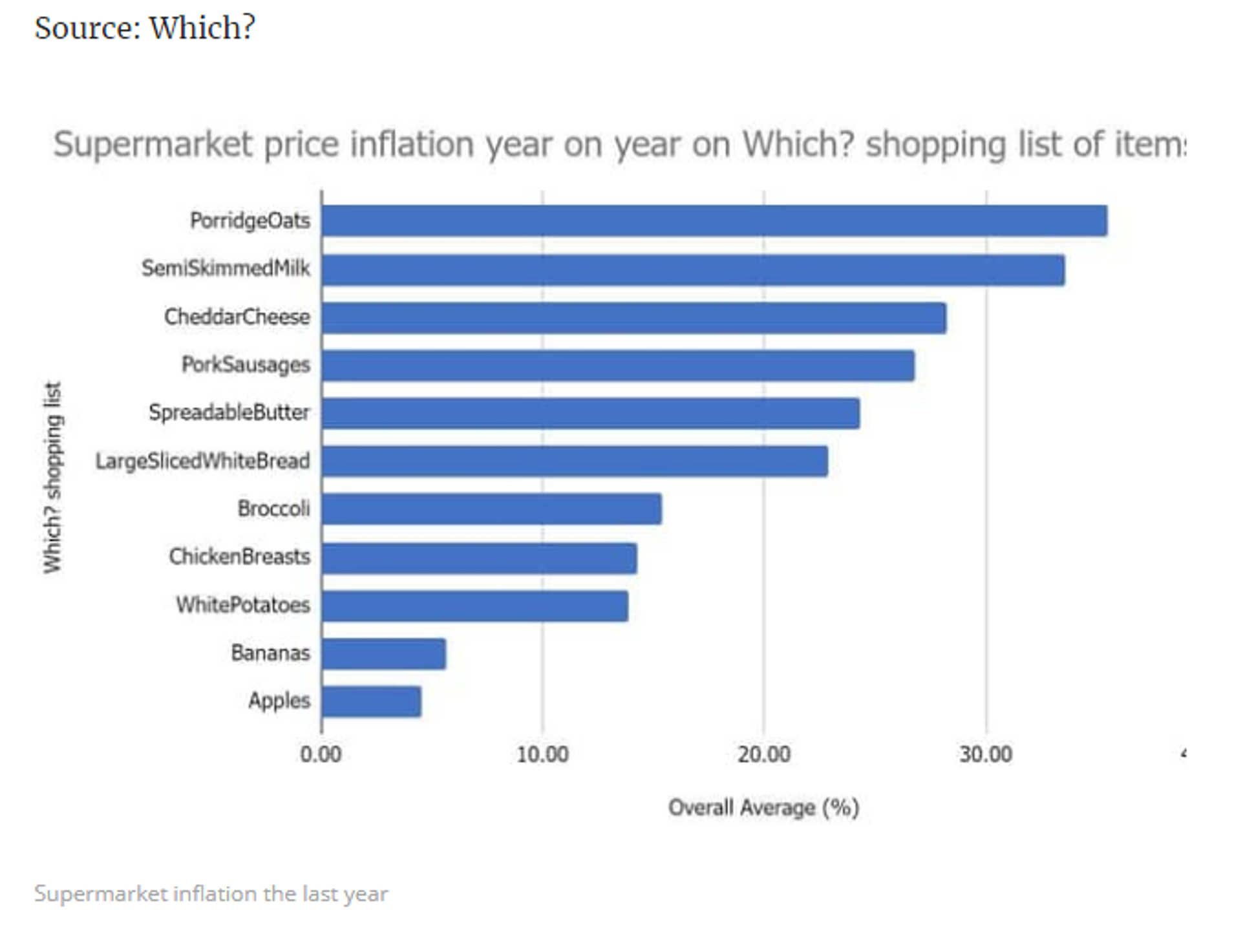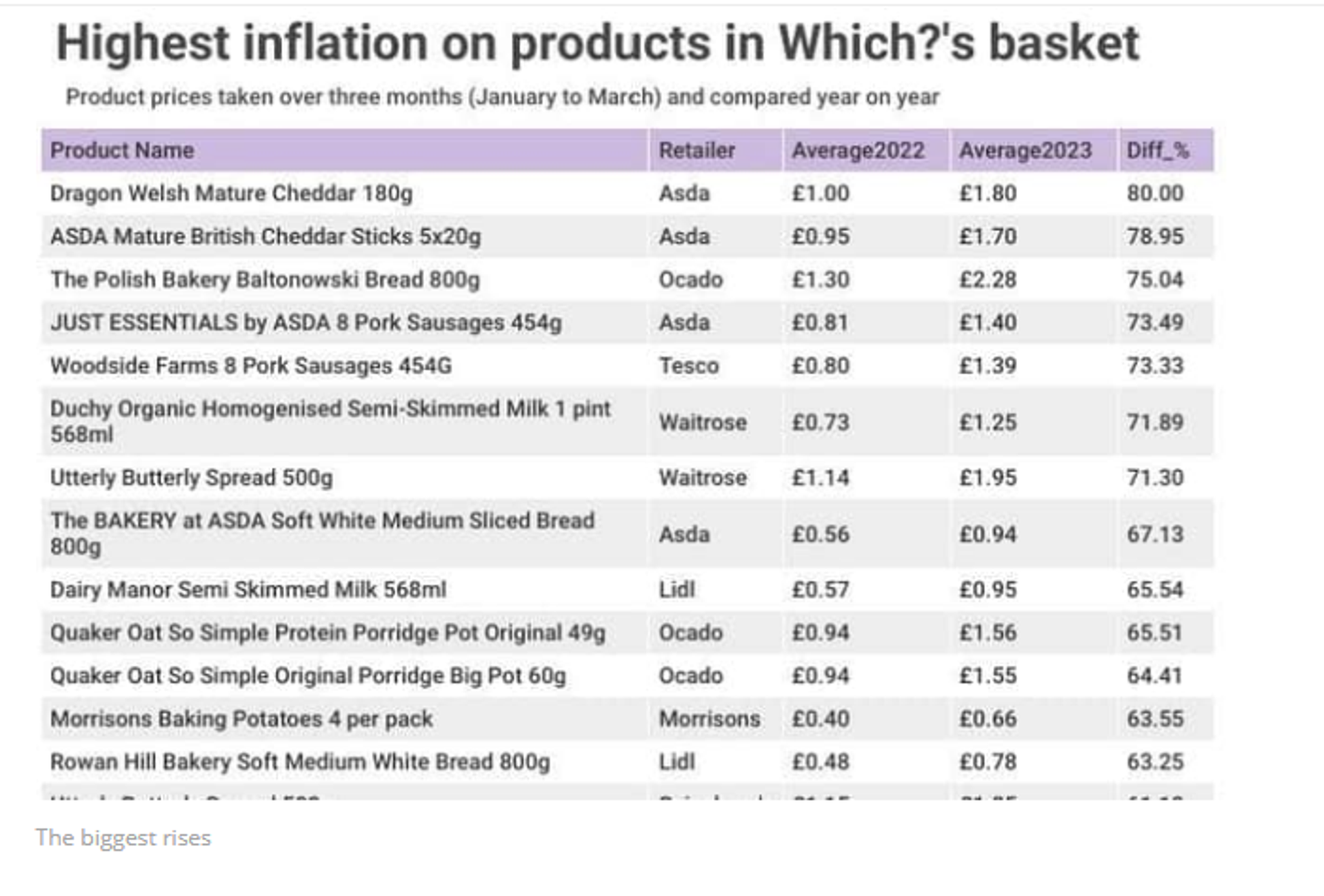https://sputnikglobe.com/20230418/say-cheese-costs-of-uk-food-staples-oats-soar-by-up-to-80---watchdog-1109611320.html
Say Cheese: Costs of UK Food Staples, Oats Soar By Up To 80% - Watchdog
Say Cheese: Costs of UK Food Staples, Oats Soar By Up To 80% - Watchdog
Sputnik International
The cost of staple foods in UK has soared by up to 80%, a consumer group found.
2023-04-18T06:30+0000
2023-04-18T06:30+0000
2023-05-28T15:26+0000
world
food
prices
cost of living crisis in uk
cost of living
inflation
cheese
united kingdom (uk)
https://cdn1.img.sputnikglobe.com/img/07e6/08/16/1099862692_0:320:3073:2048_1920x0_80_0_0_486e70b482a17fa73a24370b5a974d6a.jpg
The cost of living crisis in the UK continues its onslaught on people's budgets, as basic food staples are at present around 80 percent more expensive than a year ago, according to a consumer watchdog. Furthermore, the cheapest products are the hardest hit by inflation, percentage-wise, the analysis revealed.The rate of inflation for food - the percentage by which the price of food rises - was established after analyzing more than 26,000 food and drink products at eight British supermarkets by consumer group Which? It also looked at how the cost of a basket of everyday staples such as cheddar cheese, sliced white bread, pork sausages, potatoes and porridge oats had changed recently at Aldi, Asda, Lidl, Morrisons, Ocado, Sainsbury’s, Tesco and Waitrose. Analysis by Which? also revealed which staples had witnessed the biggest price rises.For example, across these supermarkets, prices of cheddar cheese were an average of 28.3 percent higher than a year ago (in the case of one cheese - the 180g Dragon Welsh Mature Cheddar at Asda - the rise was 80 percent on a year ago, rocketing from £1 ($1.24) in the three months to the end of March last year to £1.80 ($2.23) for the same period this year).All of the eight supermarkets surveyed saw the cost of their porridge oats rising by an average of 35.5 percent against the same time last year. Porridge oats at Ocado saw the biggest price growth of about 65.5 percent; thus, a 49g Quaker Oat So Simple Protein Porridge Pot Original rose from 94p to £1.56.An average increase of 22.8 percent was registered for 800g loaves of sliced white bread, with Asda's Soft White Medium Sliced Bread increasing by 67 percent from 56p to 94p.White potatoes saw average inflation of around 14 percent but the price of baking potatoes at Morrisons grew by 63.5 percent.When it comes to pork sausages, the increase was by an average of 26.8 percent at all eight supermarkets. However, at two of the chains the cost rises were particularly impressive: Asda’s Just Essentials budget range of eight sausages saw a rise of 73.5 percent and Tesco’s value Woodside Farms pack of sausages soared by 73.3 percent. Who said pigs can't fly?Accordingly, the tracker by Which? showed that even own-label budget items at the supermarkets in question, albeit supposed to be the cheapest, might soon be beyond the means of people already struggling to make ends meet.In the wake of the analysis, Which? urged major supermarkets to ensure that their budget line food items were more widely available.“Our latest supermarket food and drink tracker paints a bleak picture for the millions of households already skipping meals of how inflation is affecting prices on supermarket shelves, with the poorest once again feeling the brunt of the cost-of-living crisis," Sue Davies, head of food policy at Which? was quoted as saying. She added:In February, UK consumer prices spiked by 10.4 percent against the same period a year earlier, with food inflation reaching its highest figures since the Seventies, according to official data.The UK Office for National Statistics noted that food prices soared 18.2 percent through the year to February.In the United Kingdom, the increase in the cost of living began in 2021, when prices for many basic necessities began to rise faster than household incomes amid the COVID-19 pandemic, prompting people to tighten their purse strings. Surging energy prices and rocketing double-digit inflation throughout the country were also partly driven by the West's sanctions imposed on Russia over its special military operation in Ukraine. The bleak situation has affected millions of households, with vulnerable families in particular struggling to survive on a tight budget.
https://sputnikglobe.com/20230219/number-of-britons-turning-to-food-banks-skyrockets-amid-cost-of-living-crisis-study-shows-1107587717.html
https://sputnikglobe.com/20230410/uk-cost-of-living-woes-increasingly-driving-britons-to-gambling-charity-says-1109309869.html
united kingdom (uk)
Sputnik International
feedback@sputniknews.com
+74956456601
MIA „Rossiya Segodnya“
2023
News
en_EN
Sputnik International
feedback@sputniknews.com
+74956456601
MIA „Rossiya Segodnya“
Sputnik International
feedback@sputniknews.com
+74956456601
MIA „Rossiya Segodnya“
cost of staple foods, food inflation in uk, soared by up to 80%, uk consumer group, which? basket of everyday staple products, cheddar cheese, sliced white bread, pork sausages, white potatoes and porridge oats, aldi, asda, lidl, morrisons, ocado, sainsbury’s, tesco and waitrose,
cost of staple foods, food inflation in uk, soared by up to 80%, uk consumer group, which? basket of everyday staple products, cheddar cheese, sliced white bread, pork sausages, white potatoes and porridge oats, aldi, asda, lidl, morrisons, ocado, sainsbury’s, tesco and waitrose,
Say Cheese: Costs of UK Food Staples, Oats Soar By Up To 80% - Watchdog
06:30 GMT 18.04.2023 (Updated: 15:26 GMT 28.05.2023) UK food inflation reached its highest level in more than 45 years in February this year, as consumer prices spiked by 10.4 percent. The country’s Office for National Statistics singled out particular increases of costs of some vegetable items, partly because of shortages, resulting in some supermarkets introducing rationing.
The
cost of living crisis in the UK continues its onslaught on people's budgets, as basic food staples are at present around 80 percent more expensive than a year ago, according to a consumer watchdog. Furthermore, the cheapest products are the hardest hit by inflation, percentage-wise, the analysis revealed.
The rate of inflation for food - the percentage by which the price of food rises - was established after analyzing more than 26,000 food and drink products at eight British supermarkets by consumer group Which? It also looked at how the cost of a basket of everyday staples such as cheddar cheese, sliced white bread, pork sausages, potatoes and porridge oats had changed recently at Aldi, Asda, Lidl, Morrisons, Ocado, Sainsbury’s, Tesco and Waitrose. Analysis by Which? also revealed which staples had witnessed the biggest price rises.
For example, across these supermarkets, prices of cheddar cheese were an average of 28.3 percent higher than a year ago (in the case of one cheese - the 180g Dragon Welsh Mature Cheddar at Asda - the rise was 80 percent on a year ago, rocketing from £1 ($1.24) in the three months to the end of March last year to £1.80 ($2.23) for the same period this year).
All of the eight supermarkets surveyed saw the cost of their porridge oats rising by an average of 35.5 percent against the same time last year. Porridge oats at Ocado saw the biggest price growth of about 65.5 percent; thus, a 49g Quaker Oat So Simple Protein Porridge Pot Original rose from 94p to £1.56.
An average increase of 22.8 percent was registered for 800g loaves of sliced white bread, with Asda's Soft White Medium Sliced Bread increasing by 67 percent from 56p to 94p.
White potatoes saw average inflation of around 14 percent but the price of baking potatoes at Morrisons grew by 63.5 percent.
When it comes to pork sausages, the increase was by an average of 26.8 percent at all eight supermarkets. However, at two of the chains the cost rises were particularly impressive: Asda’s Just Essentials budget range of eight sausages saw a rise of 73.5 percent and Tesco’s value Woodside Farms pack of sausages soared by 73.3 percent. Who said pigs can't fly?
Accordingly, the tracker by Which? showed that even own-label budget items at the supermarkets in question, albeit supposed to be the cheapest, might soon be beyond the means of people already struggling to make ends meet.
In the wake of the analysis, Which? urged major supermarkets to ensure that their budget line food items were more widely available.
“Our latest supermarket food and drink tracker paints a bleak picture for the millions of households already skipping meals of how inflation is affecting prices on supermarket shelves, with the poorest once again feeling the brunt of the cost-of-living crisis," Sue Davies, head of food policy at Which? was quoted as saying. She added:
“While the whole food chain affects prices, supermarkets have the power to do more to support people who are struggling, including ensuring everyone has easy access to basic, affordable food ranges at a store near them, particularly in areas where people are most in need. Supermarkets must also provide transparent pricing so people can easily work out which products offer the best value.”
In February, UK consumer prices spiked by 10.4 percent against the same period a year earlier, with food inflation reaching its highest figures since the Seventies,
according to official data.
The UK Office for National Statistics noted that food prices soared 18.2 percent through the year to February.

19 February 2023, 06:11 GMT
In the United Kingdom, the
increase in the cost of living began in 2021, when prices for many basic necessities began to rise faster than household incomes amid the COVID-19 pandemic, prompting people to tighten their purse strings.
Surging energy prices and rocketing double-digit inflation throughout the country were also partly driven by the West's
sanctions imposed on Russia over
its special military operation in Ukraine. The bleak situation has affected millions of households, with vulnerable families in particular struggling to survive on a tight budget.







